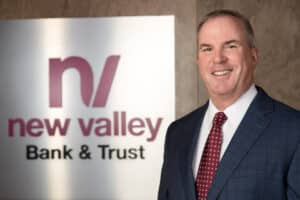Jeffrey Sullivan
President and CEO, New Valley Bank & Trust
Age: 59
Industry experience: 37 years
Springfield’s New Valley Bank & Trust opened its doors in May 2019 as the state’s first de novo in a decade – only nine months before the economy shut down as the COVID-19 pandemic hit. With only a small loan portfolio at the time, the bank’s then-15 employees, including President and CEO Jeffrey Sullvian, were able to turn its full attention to processing over 1,000 Paycheck Protection Program loans and, in the process, making valuable connections to small businesses across Western Massachusetts. Three years later, the bank has exploded from $85 million in assets in the spring of 2020 to $325 million in assets as it tries to build a statewide brand focused on serving small businesses.
Q: New Valley picked quite the time to jump into the market.
A: It certainly has been an interesting ride. We didn’t plan for a global pandemic or historic swings in interest rates. We’ve navigated a few storms and keep coming back stronger, it seems. 2023 isn’t going to be a banner year for profits for us but our core business keeps growing pretty much on track with how we expected it to go.
We have a niche that most other larger banks don’t have where we have all the decision-makers at our bank. We are focused on loans under $2.5 million. Our lane is really that small business market: professional services, small manufacturers, transportation companies that would rather be talking to a decision-maker so they feel tied into us. That segment of the market is there in good times and bad times and it’s growing here in a city like Springfield.
Q: Amid what looks like a lot of success, what challenges are you facing right now?
A: The thing that’s not as much fun right now is the cost of funds. Deposits have repriced a lot faster than how loans can be repriced. Usually, we lament our small size, but in this case our small size works to our advantage because we can work really hard at growing our core deposit base and shrinking the percentage of certificates of deposit we have in our deposit portfolio to bring down our cost of funds.
Q: You have three full-service branches now in Springfield and West Springfield. What role did branching play in your growth?
A: You hear the big banks like JPMorgan talking about how people come into their branches to open accounts, even if they never set foot in there again, and we’ve found that to be the same. Customers like to know the branch is there and have a relationship with our staff members.
We’ve talked about the death of branches in this industry for so long but we’ve found they still have a role to play. We’ll be here [at our current number of branches] until the margin pressure eases up for a little while but our market territory is all of Massachusetts and all of Connecticut. We have a niche: that might be a professional services firm in the Boston area or a manufacturing firm in Connecticut. They can do things online but we’ll also come visit them to perform certain transactions. And while we try to be competitive on our fees and prices and really strong on service delivery, our growth has relied a lot on word of mouth.
Q: Are there any broader economic trends that New Valley is riding as it grows?
A: The remote work trend has made it easier for some professional service firms to sprout up – they don’t need as much overhead as they once did. The other thing we see a lot in the Springfield region, or Western Mass. in general, is that the MassDevelopment financing that sprung out of the pandemic relief programs has helped close the equity gap for some businesses owners who didn’t have enough of their own capital to grow at the pace they wanted to. Some of that’s new funding, some is a sort of new energy that [President and CEO] Dan Rivera has brought to the agency, to be more proactive with the small business community. They’ve also got some new staff that have shown up in the last year or so who are talented folks.
It’s hard for the average business owner to know what programs are out there and what they might qualify for. We’ve – banks, state agencies and others – got to think about how to communicate out to our customers about what they qualify for. At New Valley, we’ve dedicated resources to making sure our people are educated, and we’ve hired bilingual staff. We’re not going to snap our fingers overnight and get rid of this country’s legacy of past discriminatory policies, but there are benefits accruing to those communities from money that started as pandemic relief funds but have evolved into economic development funds.
Q: Explain that a bit more. How has this helped New Valley grow?
A: In a place like Springfield, there are families that have not been able to pass wealth down from generation to generation. We encounter a lot of smart people who’ve never had the family wealth to get down payments to start a business, buy real estate, pay for an expensive college or what have you. People are looking for a chance to build wealth and pass it on, like we’ve always done in America.
The future of our economy in Springfield is small businesses, not large businesses, and it’s a lot of Black and Brown businesses. We have to make sure we’re relevant to those communities and provide the best advice we can.
Q: Did the spring’s banking crisis set you back at all?
A: We were lucky that our core deposit base was really sold when the bank failures happened. We did not see any flight of deposits out of the bank for safer havens. It’s been great that we have very loyal customers who kept their faith in us, and we haven’t seen any deposit outflows driven by anything other than rates.
You have to make choices with how you can accommodate customers on rate but keep the relationship for the long term. It is a better long-term strategy to accommodate the depositor through this period of time, even if you don’t like the rates you have to pay, then letting them walk out the door and try to reacquire them at a later date? I like to try to keep people.
A lot of business owners come to banks for loans, but what cements the relationship is the level of technology and service we can bring to the table – technology that’s delivered by real human beings. There’s always someone here when something goes bump in the night, when a piece of software isn’t talking another right. And the level of fraud that the small business community is facing – ransomware, account takeover, even old-fashioned check fraud – that’s one of the things I’ve found we do well, that we didn’t think we needed to do well when we opened the bank. We get to know our customer behavior patterns really well so, number one, we can accommodate them for any experience they’re looking for, but also we can see easily see when something looks out of place and get on the phone with them.
Sullivan’s Five Favorite New Restaurants in Western Massachusetts
- Jackalope, Springfield
- Protocol, Amherst
- Springdale Cajun Diner, Holyoke
- Kaisen, Feeding Hills
- Lechonera El Paseo, Holyoke







